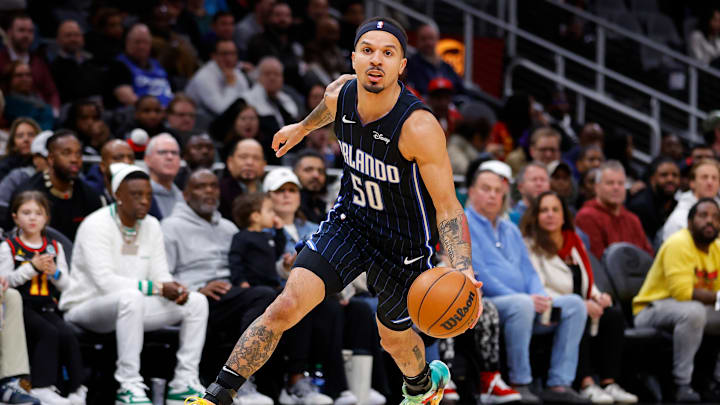In Wednesday's game against the New York Knicks, the Orlando Magic needed a boost from their bench. Jalen Brunson torched the team for 20 points in the first quarter alone and staked the undermanned Knicks a nine-point lead after the first quarter.
The Magic needed their bench to take over. They needed a big showing to open the second to get back into the game and take control. That is something Orlando has relied on throughout the season. The two-headed offensive monster of Cole Anthony and Moe Wagner gave the team a distinct advantage.
That has not been so reliable of late. Anthony, especially, had been in a big shooting slump. But the second quarter belonged to the Magic this night.
Orlando went on a 17-3 run to open the quarter. And Anthony played a big part, scoring six points on 3-for-4 shooting in 10:12 of action in the quarter. The Magic flipped the game on its head and ran away for a 118-100 win.
Anthony was able to squeeze his way into the lane, hit his floaters and create separation on fadeaways. He finished with 11 points on 5-for-8 shooting, a nice reprieve from several weeks of struggle.
Fresh off inking a three-year, $39-million contract extension, Anthony started the year by embracing his role as the scoring guard of the second unit.
In the first 20 games of this season, a stretch when the Magic went 14-6, Anthony averaged 15.2 points per game on 37.2 percent from three. Correlation does not always mean causation, but Anthony's production did not hurt.
He, along with Wagner, was garnering Sixth Man of the Year and Most Improved Player buzz, as their effective and efficient play was a significant driving force behind the Magic's winning ways.
But the chatter about Anthony winning NBA awards now seems like a distant memory.
In the last 20 games, Anthony has averaged 8.3 points per game and shot 25.5 percent from three. His effective field goal percentage of 44.0 percent ranks 139th amongst guards who played at least 10 games in the same time frame.
Since his initial hot start, most of Anthony's advanced statistics have been heading in a similarly downward trajectory.
His true shooting percentage bottomed out in January at 48.4 percent, with his turnover rate hitting its rock bottom this month at 26.7 percent. That number is absurd, indicating that more than a quarter of Anthony's possessions end in a turnover.
His play looks more unsure, his shot selection more haphazard, and his frustration level high.
Anthony has been dealing with a quadricep contusion that put him on the injured list a few times. But he will not be caught making excuses. He played through it. And he acknowledged he has to start playing a lot better.
It is too early to press the panic button on Anthony and his extension. Those who follow Anthony have seen similar peaks and valleys in his output over previous seasons. His production has tended to bottom out in the middle part of the season, only to resurge as the season comes to its finale.
But the question needs to be asked: Is this Anthony's final evolutionary form? That is one Pokemon allusion Anthony, an enthusiast for the anime empire, may not appreciate in this context.
Is Anthony a streaky player who will continue to have roller coaster-like ups and downs within seasons throughout his career?
Sadly, that theory seems to bear itself out as you look back on Anthony's career going back to college. He has had flashes of effectiveness interrupted by valleys and struggle.
That is the same in his NBA career too. Even last year, Anthony had a 35-game stretch from November to the All-Star Break where he averaged 11.6 points per game and shot 32.7 percent from deep. He finihsed his season averaging 14.9 points per game and shooting 41.8 percent after the All-Star Break.
There is hope for a big push once the team reconvenes next week. The break may do Anthony some good to prepare for the postseason push.
What is different about this time around is that there is no longer the extensive runaway for Anthony to shoot himself back into form. There are stakes to the season ahead.
The Magic made no moves at the deadline that might consolidate the team. The depth at the guard position is real.
Cole Anthony's poor play can only continue for so long before coach Jamahl Mosley is obliged to give more minutes to Joe Ingles, Gary Harris, Anthony Black, or, dare I write, Jett Howard.
The Magic cannot afford very many empty minutes. As the pressure for the postseason increases, the team will tighten its rotation and its minutes, even among established players in the rotation, like Anthony.
He is already playing a career-low 13.7 minutes per game in February. If he doesn't get back to more efficient scoring, even those minutes may evaporate in the warming Orlando weather.
Anthony is a hard worker, commenting in the previously referenced interview that he is carving time for individual work and getting up more shots. He remains confident, and Magic fans should, too, that he will start to see his shots fall.
Magic faithful are just hoping that it happens sooner rather than later. Otherwise, the recently extended Anthony could fall out of the rotation.
